The internet is ablaze with rosemary water – but does it live up to the hair growth hype? This detailed guide is based on my personal experience of making and using rosemary water for hair.
This natural remedy can help boost hair growth and thickness, clarify and soothe the scalp, and promote silky, shiny hair. Read on to discover how to make rosemary water, the best ways to use it, and the science behind its benefits for hair and scalp health.
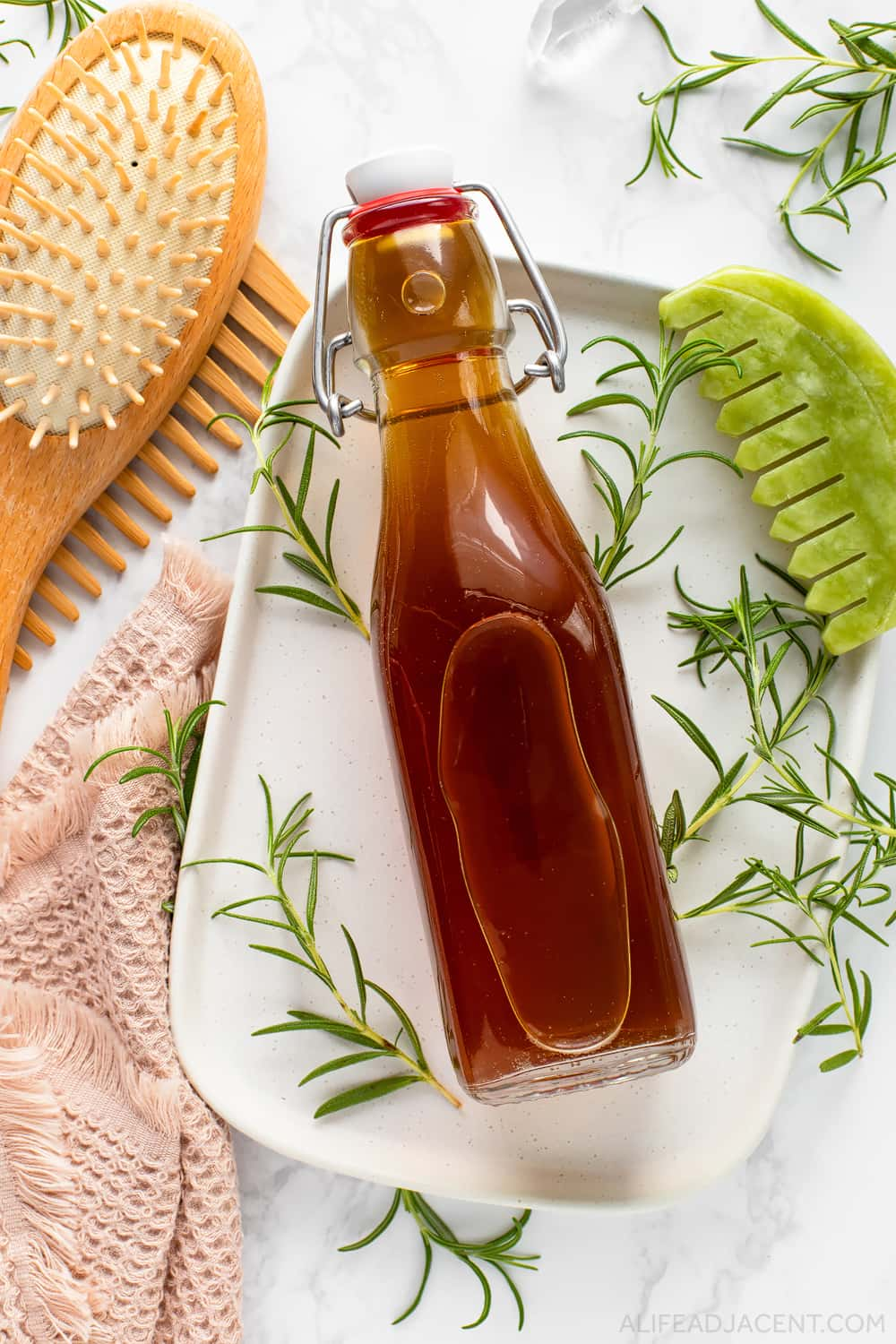
Everywhere you turn, someone is talking about how to use rosemary to grow longer, thicker hair, whether that’s by using homemade rosemary water or the equally popular rosemary oil.
I’m not a fan of bogus beauty recipes – and when it comes to TikTok beauty tips, it’s important to be extra discerning. But, like castor oil, this is one of those hair growth tips that truly does work.
Boiling rosemary leaves creates a fragrant herbal tonic with a variety benefits for hair and scalp. Not only does rosemary water stimulate healthy hair growth and thickening, but it also helps reduce dandruff, combat oil, relieve itchy scalp, and even naturally dye your hair.
After experiencing its benefits firsthand, I wanted to do a deep dive into why it works so well. I hope this in-depth guide will help you get the most out of your DIY rosemary water!
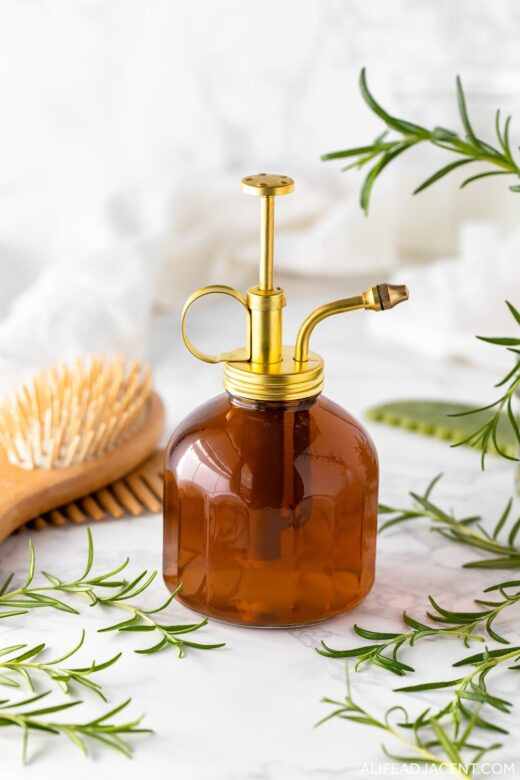
In this post, you’ll discover:
- Benefits of rosemary water for hair and scalp health
- Scientific evidence behind how it works for growth
- How to make it properly for best results
- Rosemary hair spray + rosemary hair rinse recipe
You’ll also find answers to common questions, such as:
- What kind of water should you use?
- Why can’t you make it with rosemary essential oil?
- Can it cause hair damage or other side effects?
- What is the pH level?
Fair warning: this is a long guide packed with information and personal experience. If you’re not interested, you can skip straight to the rosemary water recipe and step-by-step process photos.
What is rosemary water?
Rosemary water is a hair growth tonic made by steeping water and rosemary leaves. The resulting fragrant, dark-colored liquid is infused with all of rosemary’s benefits for hair and scalp health.
Afterwards, the herbal tea can be used to make a hair rinse, scalp spray, and other rosemary hair growth recipes. It can also be used to impart hair with rich golden tones, making it ideal for darkening hair naturally.
Rosemary water is also sometimes called rosemary hair tea, but it’s steeped longer than tea for drinking. A long simmer releases the rosemary leaves’ beneficial constituents for hair health, including caffeic acid, rosmarinic acid, and hair-smoothing tannins1,2.
Finally, it’s important to note that you cannot make rosemary water with essential oils, despite what some may say – more on this later.
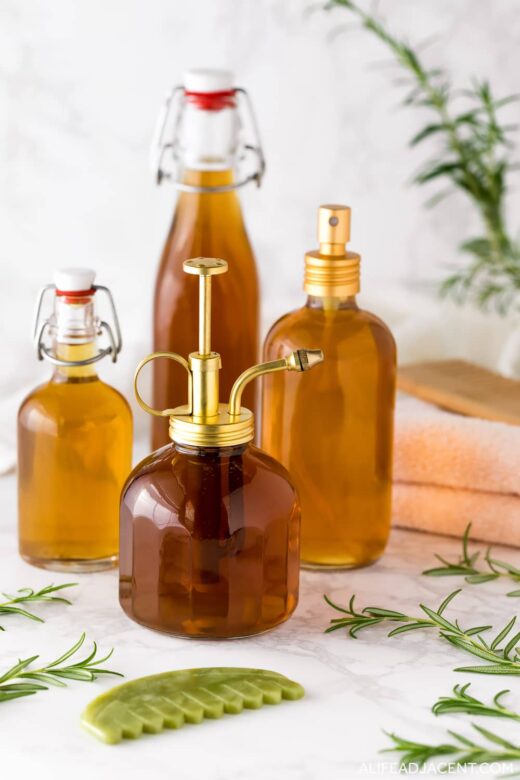
What makes rosemary water different from rosemary oil?
While both share many benefits for hair regrowth and scalp health, there are a few things that set rosemary water apart from rosemary oil. For one, it has unique properties that the oil doesn’t, including tannins, saponins2, and pH-balancing effects.
Tannins are a class of polyphenols with astringent and hair-smoothing properties. In fact, tannin-based treatments are offered as natural alternatives to keratin treatments, helping to smooth, protect, and repair the hair3,4.
Tannins are also water soluble, which is why you can’t get them from rosemary essential oil or an infused carrier oil. The same goes for saponins, which act like natural “soap” to gently cleanse and clarify the hair.
Finally, another unique benefit of rosemary water is its mildly acidic pH. It helps seal the hair cuticle, reduce frizz, and boost shine, offering similar benefits to a vinegar rinse5.
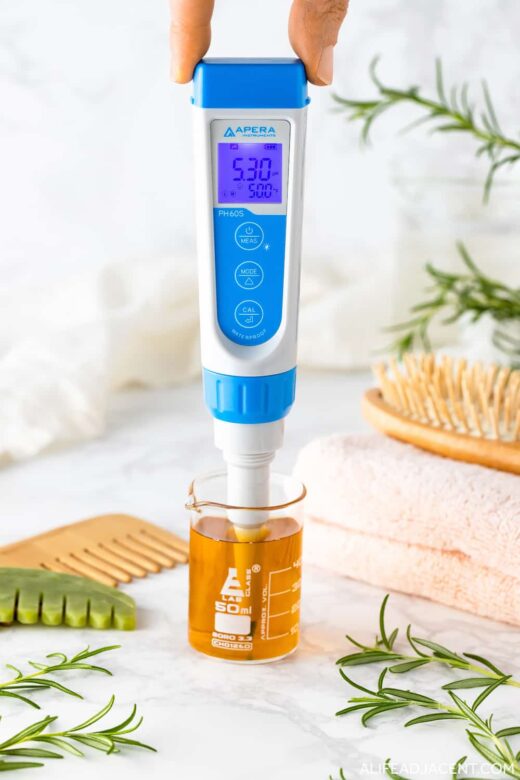
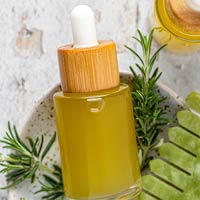
Benefits of rosemary water for hair
Rosemary’s potent hair growth effects are well-documented, but the full scope of research is too broad for one article. So, the following are just some of the benefits you can expect from regular use.
1. Stimulates hair growth and thickening
Rosemary has been found to be just as effective as minoxidil for hair regrowth,6 and using rosemary water is one way to reap the benefits.
Rosemary helps stimulate scalp blood flow, supplying the hair follicles with vital nutrients for healthy hair growth6. In the cited study, it increased both hair count and density, quite literally making hair grow faster and thicker.
But that’s not all – rosemary water also possesses a wide spectrum of growth-boosting antioxidants, including rosmarinic acid, carnosic acid, ursolic acid, and caffeic acid. These help hair grow by suppressing scalp inflammation, which is known to contribute to hair fall8.
Antioxidant benefits include:
- Caffeic acid, whose anti-inflammatory properties have been shown to help mitigate chemo-induced hair loss9
- Rosmarinic acid, which suppresses androgens that cause hair fall10.
- Ursolic acid, a natural DHT blocker and 5-alpha-reductase inhibitor (similar to hair loss medications like finasteride11)
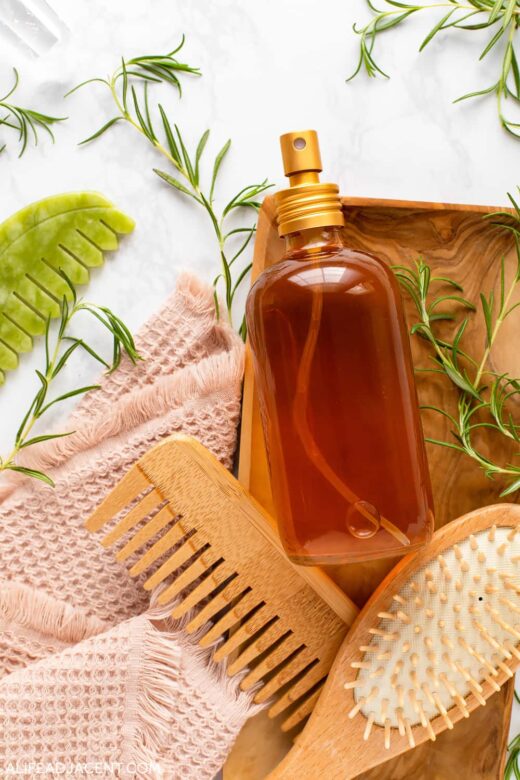
2. Reduces dandruff and itchy scalp
Rosemary has potent anti-fungal and antibacterial properties. In particular, it helps suppress Malassezia, a species of scalp yeast linked to dandruff, seborrheic dermatitis, and itching12.
If you struggle with dandruff or other scalp issues, using rosemary water can help keep yeast and bacteria in check. There’s lots of anecdotal evidence that it helps reduce dandruff and itchy scalp, and I’ve personally found it very helpful for these issues.
Plus, since dandruff and Malassezia are associated with hair loss13, keeping your scalp healthy is yet another way in which rosemary water benefits hair growth.
3. Clarifies hair and reduces scalp buildup
If your hair looks dull or lifeless, or if your scalp feels gunky or greasy, a rosemary hair rinse makes an excellent DIY clarifying treatment.
Rinsing with rosemary water helps remove buildup from the hair and scalp, leaving your scalp clean and your strands shiny, bouncy, and full of volume.
Its naturally clarifying tannins bind to fats and oils14, which helps explain why rosemary tea reduces oiliness. In fact, you can spritz it on an oily scalp to help hair appear less greasy.
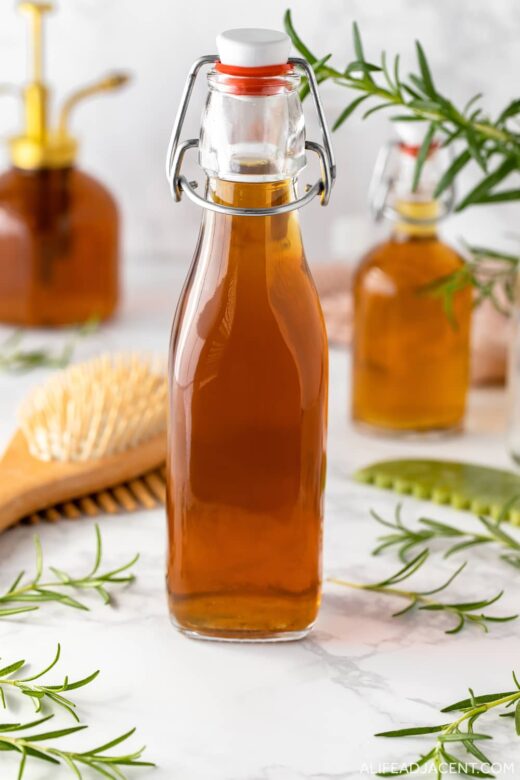
4. Reduces frizz and boosts hair shine
Whether your hair is straight, wavy, or naturally curly, rosemary tea helps enhance your natural texture to help your hair look its best. Personally, it leaves my my waves more defined, smooth, and silky.
It’s well known that vinegar’s acidic pH help smooth the hair, which is why vinegar rinses are so popular, and the tannins in rosemary water have similar smoothing effects.
Its low pH helps close the cuticle and reduce static electricity on the hair’s surface5. This improves hair slip, prevents frizz, and helps strands dry smooth and shiny.
5. Helps strengthen and protect hair from damage
Hair is very susceptible to free radicals and oxidative stress, which are prime causes of hair damage16. But rosemary water’s potent antioxidants can help strengthen the hair, offering a protective shield against heat, pollution, and UV damage17.
Of course, this isn’t to say that it replaces heat protectant – and please do not use hot styling tools on wet hair! But, it certainly can’t hurt to infuse your hair with extra antioxidants, which is another good reason to incorporate rosemary water into a hair spray.
6. Natural hair darkening properties
Finally, rosemary is also often used as a natural hair dye or herbal hair toner. It can darken and enhance golden tones in any color, but its effects are most visible on blonde hair.
I’ve been using it to stain my hair a darker, more golden blonde. However, rosemary water may also increase brassy tones in your hair, so you may want to combine it with a purple toning shampoo if that’s an issue for you.
Rosemary oil vs rosemary water for hair growth
So, which hair growth recipe is best for you – rosemary oil or rosemary water?
If your goal is to grow long hair, mitigate hair loss, or reduce dandruff, you can use either one, or better yet, both. I use them together as part of a rosemary-infused natural hair care routine.
But if you don’t like the feeling of an oily scalp, or if your hair goals also include clarifying, reducing frizz, or darkening, you may prefer rosemary tea. Sure, bottled products are available, but you make your own with my easy tutorial below.
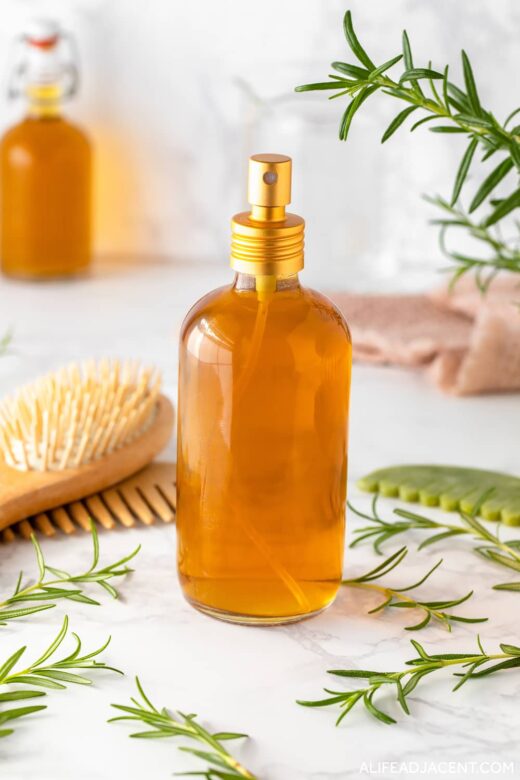
Rosemary water ingredients
Now that we’ve covered the benefits, let’s get into how to make rosemary water for hair growth. The process is simple, and you’ll need only two ingredients:
- Distilled water
- Fresh rosemary sprigs or dried organic rosemary leaves
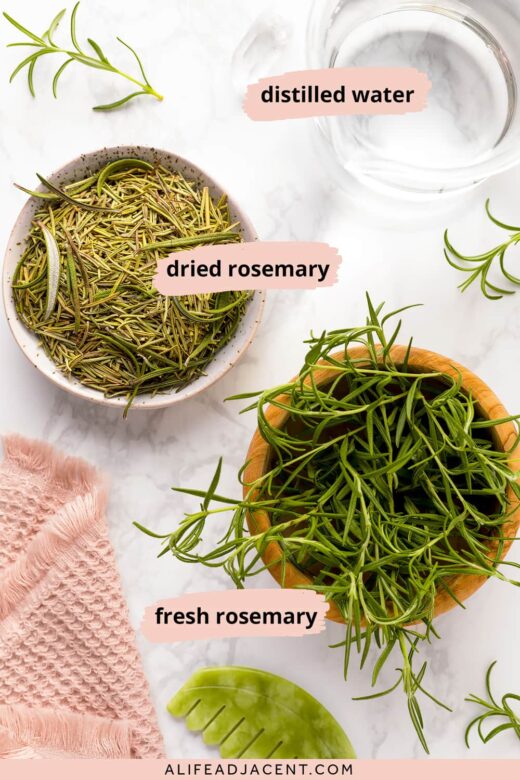
What kind of water should I use to make rosemary water?
When it comes to making your own rosemary water, pure distilled water is best, as the hair is very sensitive to pH levels5 and mineral deposits.
Unlike filtered water, distilled water is free of all minerals and impurities that can interfere with the final product, which also lengthens your rosemary water’s shelf life.
Luckily, distilled water is relatively inexpensive and can be used to make other DIY beauty and hair care products.
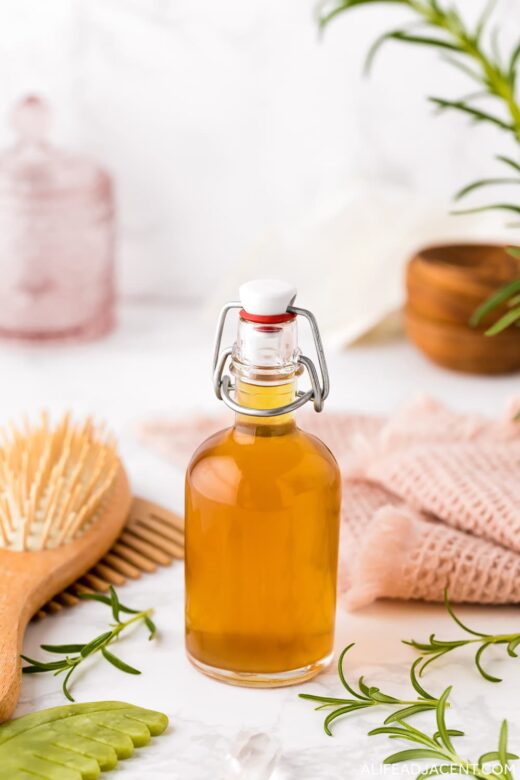
What kind of rosemary should I use for rosemary water?
You can use fresh or dried rosemary to make rosemary water for hair. If you have an abundance of fresh rosemary in your garden, you’re in luck!
But fresh rosemary isn’t always in season, and doesn’t grow in all climates. So you can also opt to use dried organic rosemary leaves, which are available in bulk at an affordable price.
Since dried rosemary is more concentrated than fresh, you won’t need to use as much. You can also use the leftover to make rosemary hair oil.
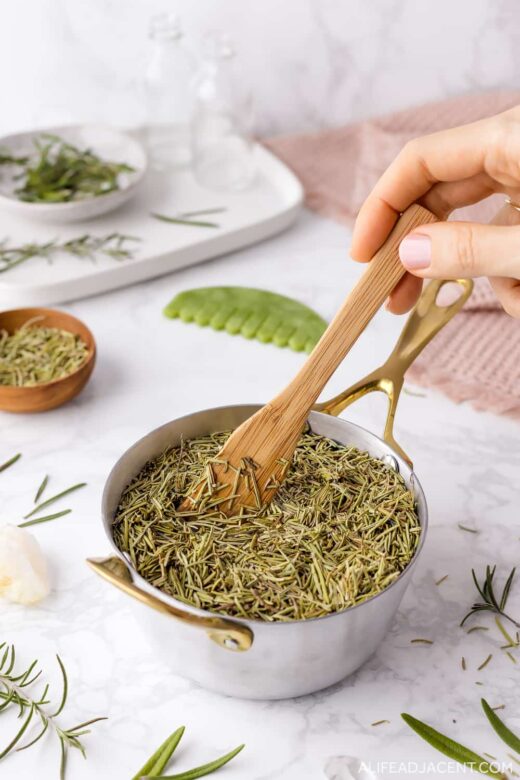
How much rosemary do you need?
Here’s a general guideline:
- For a gentle rosemary hair rinse, use 1/4 cup of dried rosemary (approximately 12 large sprigs of fresh rosemary) to 1 litre of distilled water.
- For strong rosemary water, use 1/2 cup dried rosemary (24 large sprigs of fresh rosemary) to 1 litre of distilled water.
- For a highly concentrated clarifying rinse, use 3/4 cup dried rosemary to 1 litre of distilled water (this is harder to achieve with fresh sprigs).
The more rosemary leaves you use, the stronger and more astringent your hair tonic will be.
You’ll likely want a medium strength rosemary water for hair growth. To darken or clarify your hair, you’ll want to make a stronger hair tea.
But making rosemary water isn’t an exact science, and its strength also depends on how much water evaporates while it boils. You’ll be able to determine your tea’s strength by its color – gentle rosemary water is the color of light iced tea, while a stronger infusion is a rich, dark amber color.
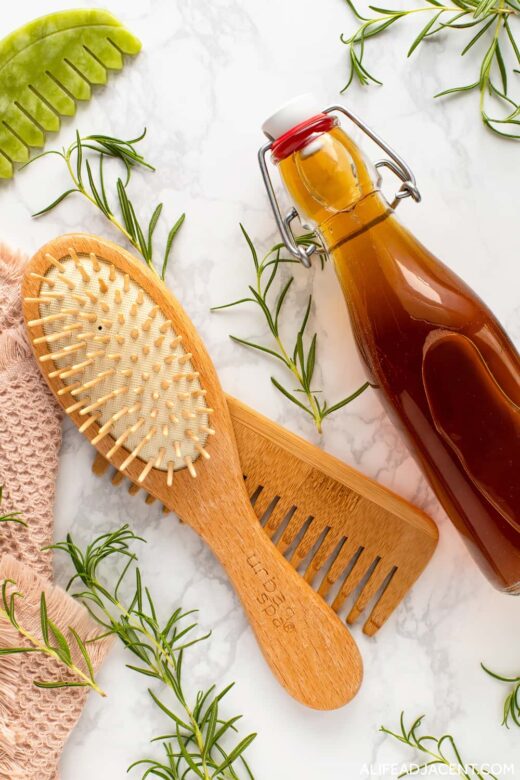
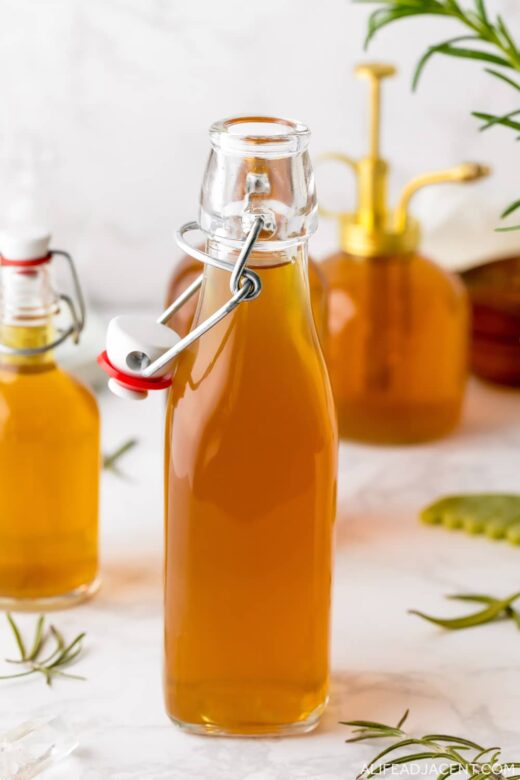
Rosemary Water Recipe
1 litre distilled water
1/2 cup dried organic rosemary (or 24 large fresh rosemary sprigs)
How to make rosemary water for hair
- Combine rosemary and water. Place rosemary in a stainless steel saucepan. Pour distilled water over top to cover the herbs, and stir to ensure the leaves are submerged. (If using fresh rosemary, be sure to wash it beforehand.)
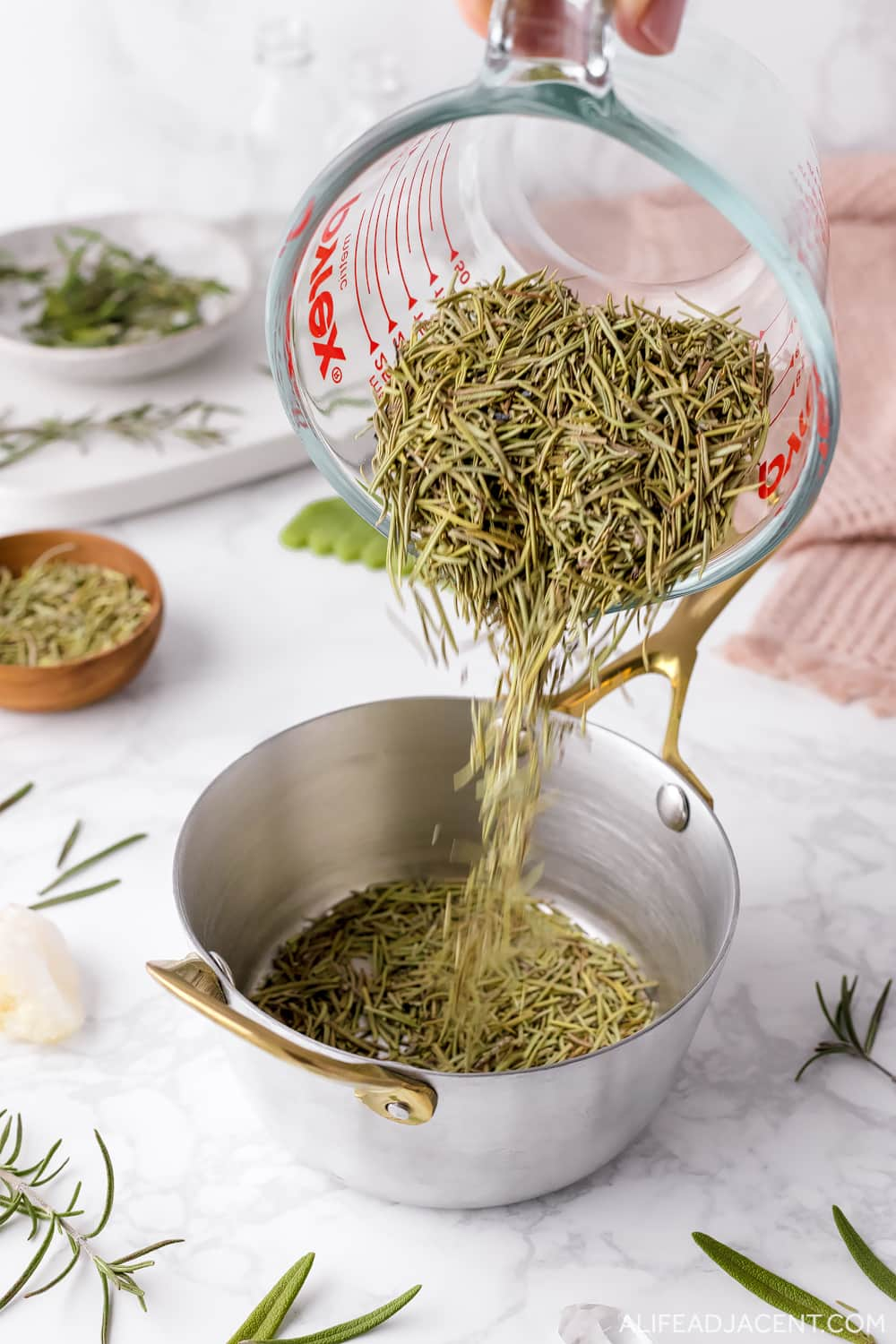
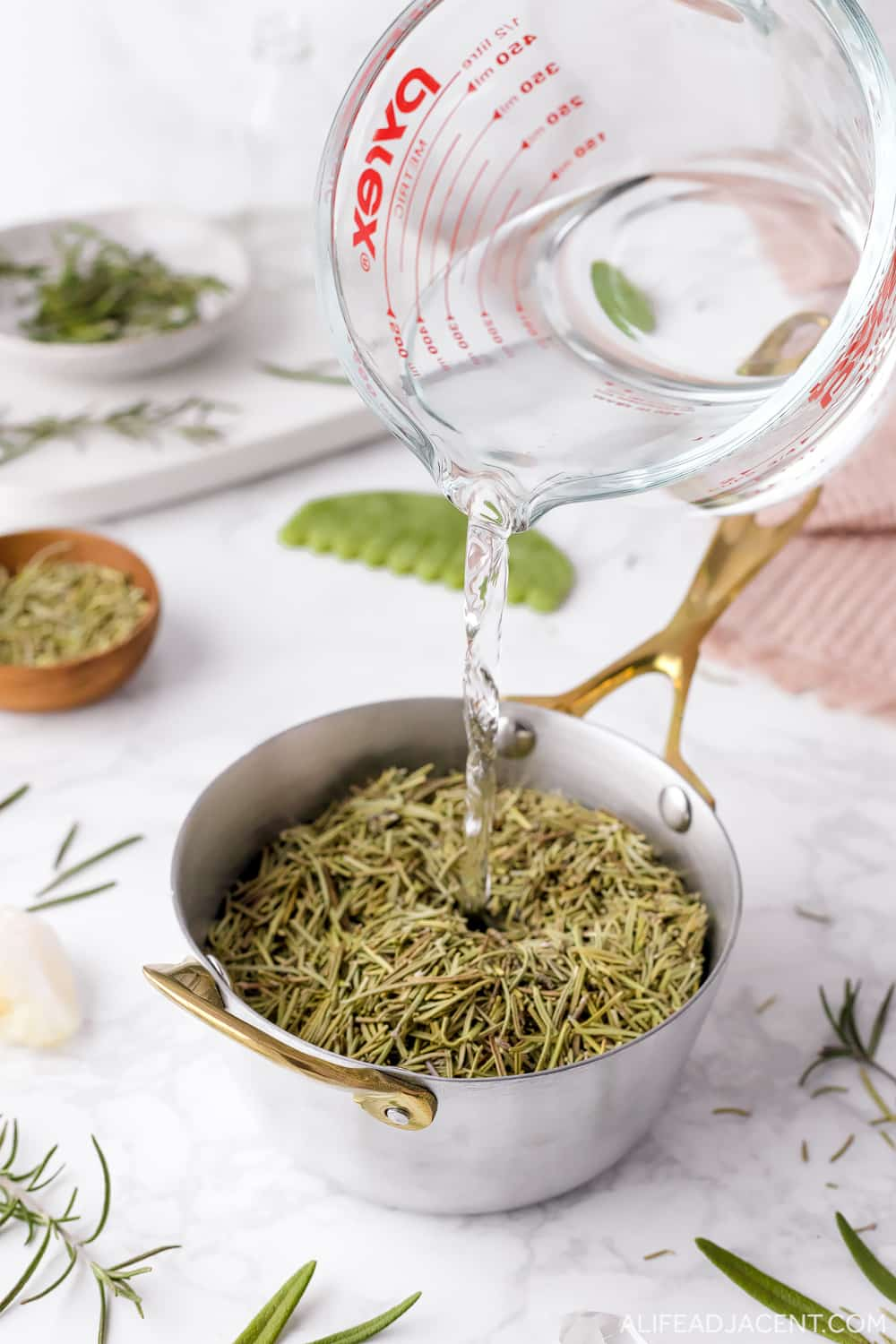
- Boil the rosemary. Bring the rosemary mixture to a boil and allow it to bubble for a few minutes. Stir the mixture again, then cover the pot with a lid and reduce the heat to low. Don’t skip the lid – this helps prevent too much water from boiling off. (However, if you’d like a more concentrated rosemary hair tea, you can also choose to boil off more water.)
- Allow to simmer. Leave the rosemary water to simmer for 30-40 minutes, allowing the leaves to steep and release their hair growth benefits. There’s no need to boil your rosemary for hours, which can degrade its quality. You’ll know it’s ready when the rosemary looks “cooked” and sinks to the bottom of the pot, and when the water is the color of tea. It will also have a characteristic herbal rosemary fragrance, and smell a bit like tea.
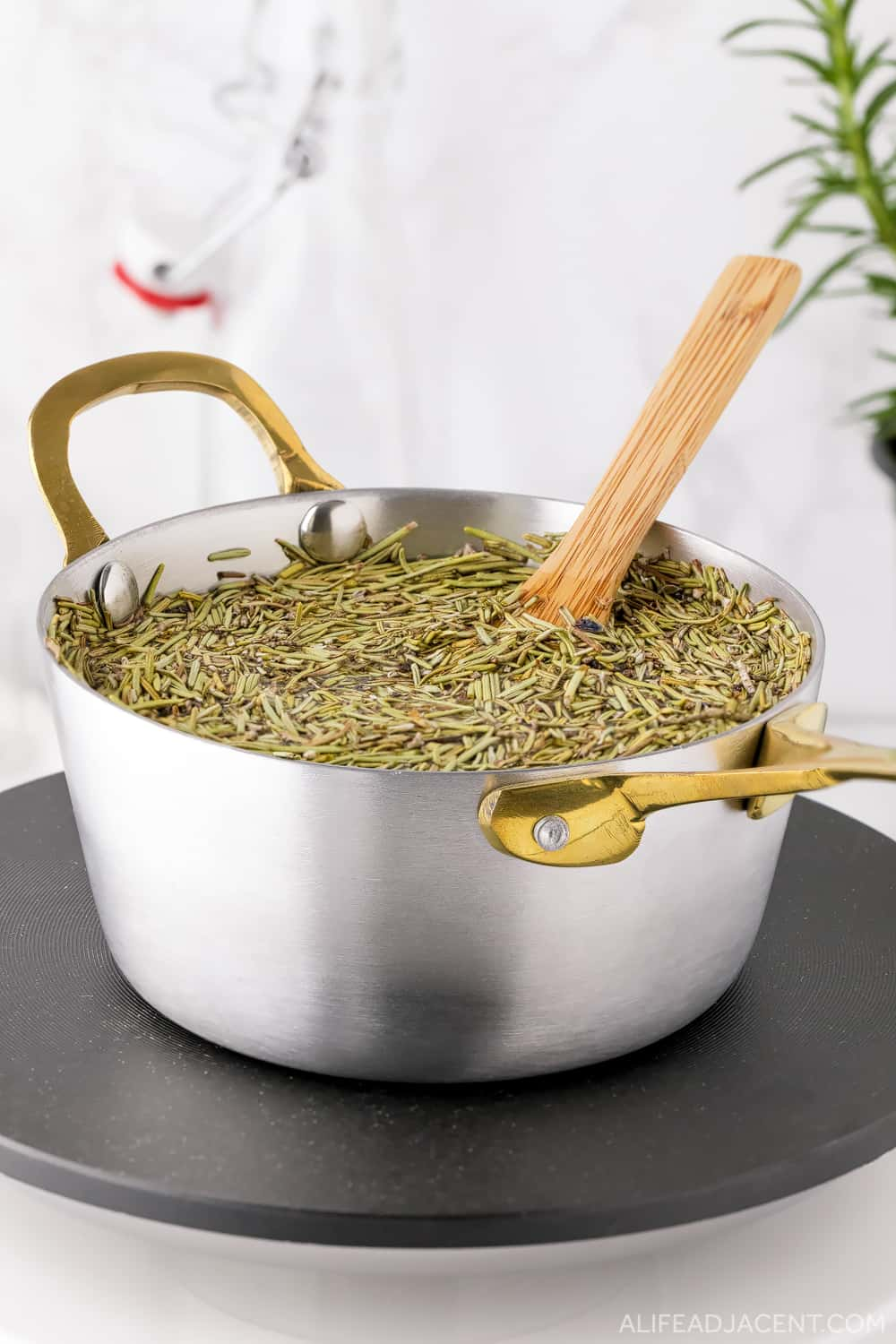
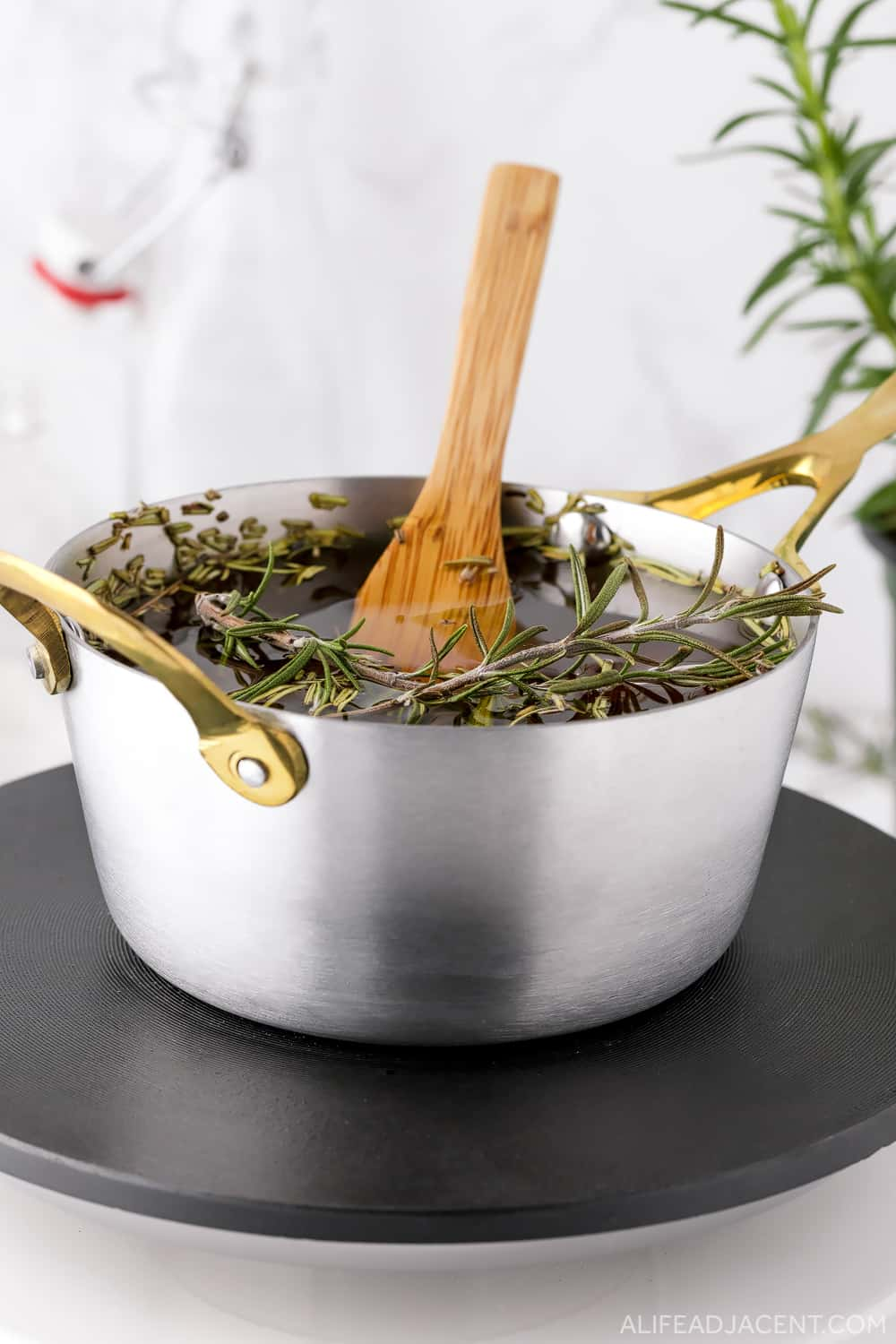
- Allow to cool. If desired, you can continue to simmer and steep the tonic to your desired strength. Once it’s strong enough, shut off the heat and allow it to cool to room temperature.
- Strain rosemary. Using a metal strainer, strain out the rosemary from the liquid and transfer to your desired container, such as a large mason jar or pretty gold spray bottle. Your rosemary water is ready for use as a hair rinse or hair growth spray.
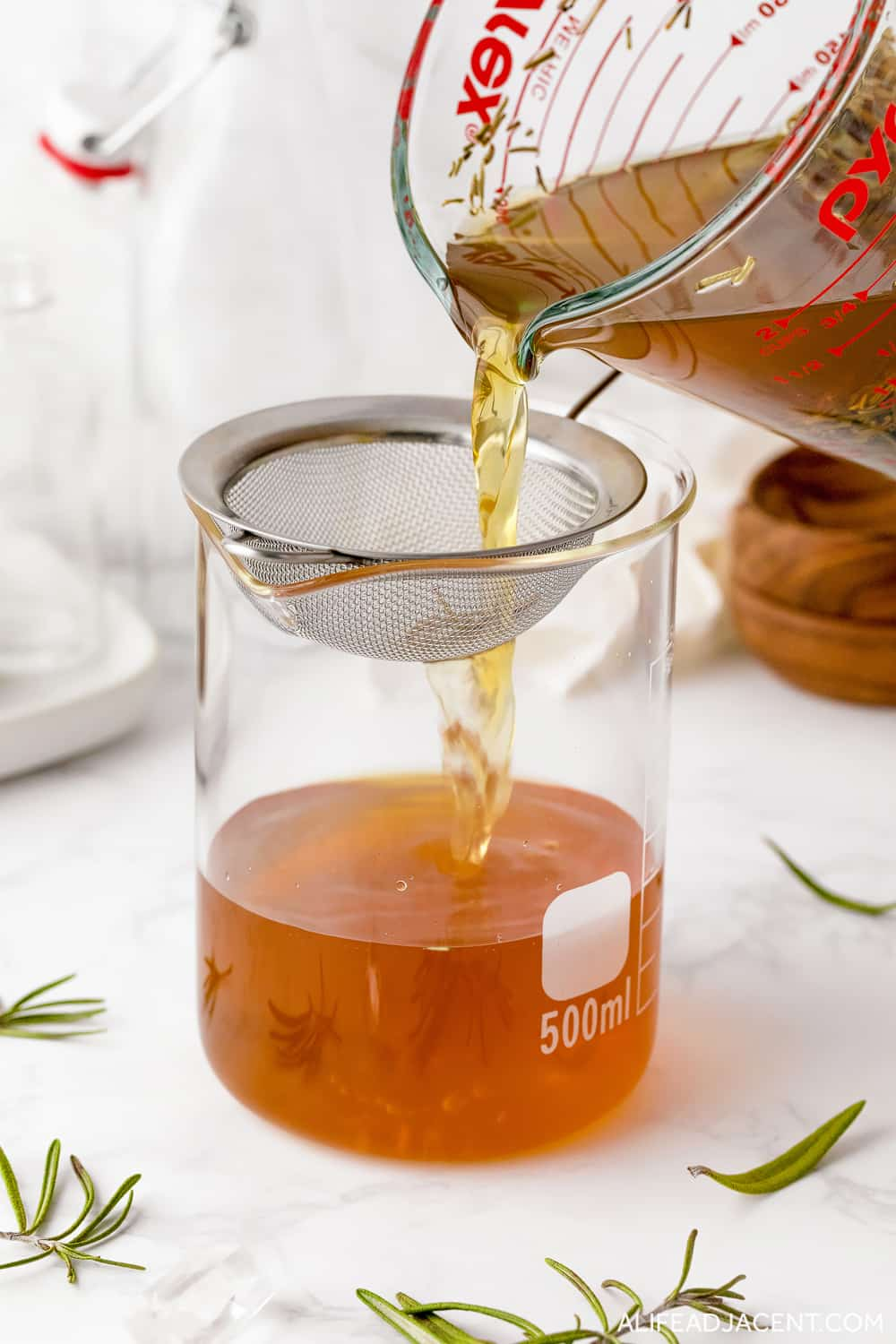
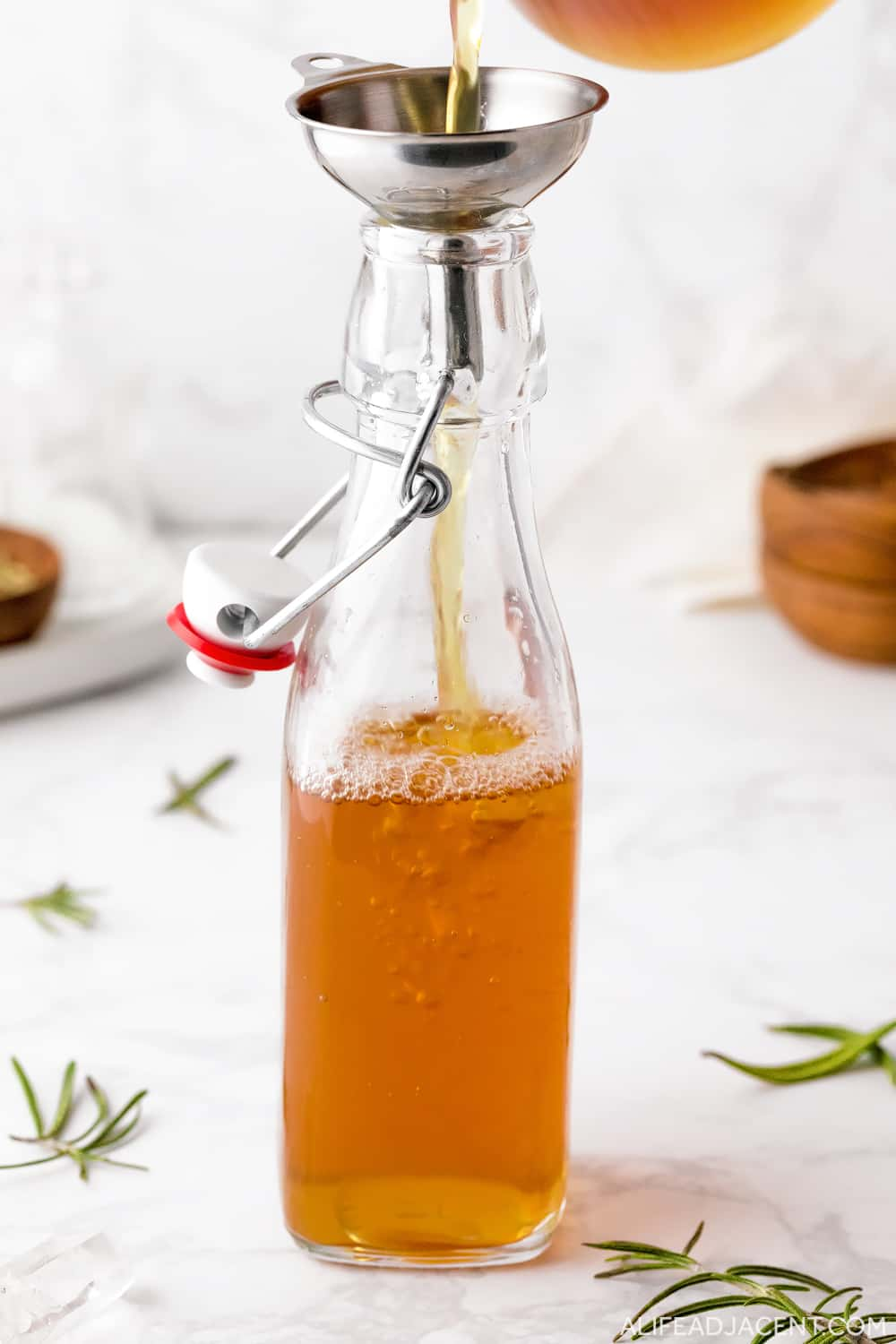
How to use rosemary water for hair
To reap rosemary water’s hair growth benefits, it’s best to apply it as a hair rinse or scalp spray. For hair smoothing and darkening, try an all-over hair spray.
Finally, you can also incorporate it into other DIY hair products – use it as the base for a dry shampoo spray or in a micellar rinse to replace shampoo.
Rosemary Hair Rinse
The shower method is the classic way to use rosemary water for hair. Simply fill a shower-friendly container with enough tea to completely douse your hair and scalp, and use it to rinse your hair as the last step of your washing routine.
A swing-top bottle works well – just be careful with glass in the shower!
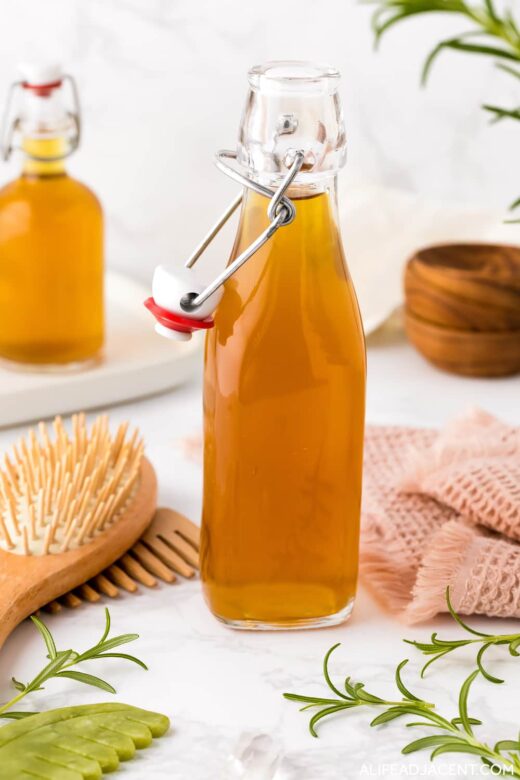
How to use rosemary hair rinse
After shampooing and conditioning, squeeze any excess water out of your hair. This is important, because if your hair is already waterlogged, it won’t absorb as much rosemary water.
Tilt your head back and pour the rosemary water all over your head, being careful not to get it into your eyes. Be sure to focus on the scalp, which is where the tea can exert its hair growth effects.
Leave the rinse in your hair for at least a couple minutes before towel drying and continuing your hair routine as usual. Do not rinse.
Rosemary Scalp Spray
Spritzed on the scalp, rosemary water helps stimulate faster hair growth and combat oiliness with a refreshing tingle. It also has analgesic properties, so it can help reduce itching and soothe a sore scalp.
To make a growth stimulating scalp spray, simply fill a spray bottle with rosemary tea and spritz directly on your hair’s roots, making your way around the entire scalp.
Rosemary scalp spray is best used on clean or slightly oily hair between washes. You can also use it in conjunction with dry shampoo to refresh an oily scalp fast.
Fine mist bottles are pretty, but large trigger spray bottles give you a better stream. After use, you can apply a hair growth oil to a dry scalp to further boost growth.
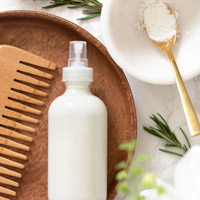
Rosemary Hair Spray
If your hair is feeling frizzy or dry, you can wet it down with a rosemary water spray to help it dry softer and smoother. It makes an excellent hair refresher spray to revitalize dry strands between washes, or to “reset” your hair without jumping in the shower.
Simply pour rosemary water into a spray bottle and spray directly on your hair to reduce frizz, boost volume, and enhance shine. Don’t forget to douse your scalp to take advantage of its benefits for growth and scalp health, too.
Comb through your hair gently and continue with your day as usual, allowing your hair to dry.
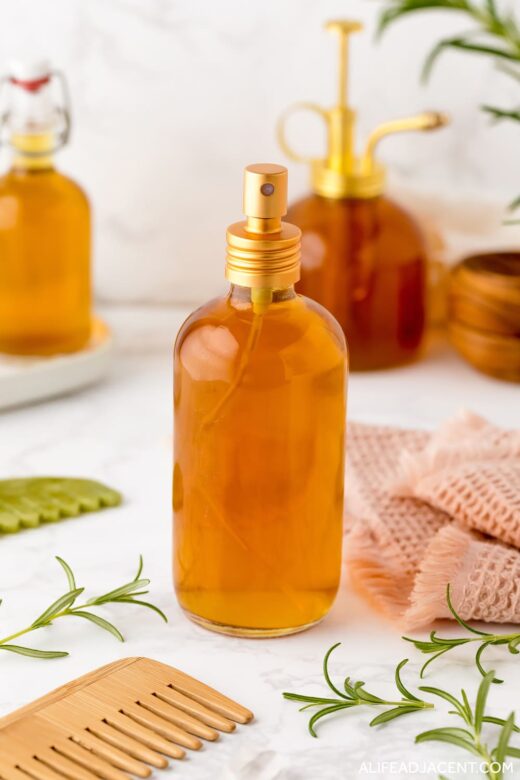
❓Rosemary Water for Hair Growth FAQ
Can rosemary water damage your hair?
It’s important to note that when used in excess, rosemary water can damage your hair by causing dry, brittle strands that are more prone to breakage.
Rosemary tea is astringent, which means it removes water from tissues15. It’s also high in tannins, which bind to lipids. When used frequently, rosemary tea may strip too many lipids from the hair shaft, leaving the cuticle dry and susceptible to damage.
This is why it’s important to not overuse rosemary water, because you can have too much of a good thing. As well, please be mindful of using homemade rosemary water that’s too strong.
Why does rosemary water make my hair feel dry?
If your hair feels dry or “rough” immediately after rinsing with rosemary water, that’s the astringent tannins at work. This feeling should subside by the time your hair dries, leaving it smooth and silky.
However, if your hair feels like straw even after drying, your tea was likely too strong for your hair type. You’ll need to experiment with using less rosemary. In the meantime, you can dilute your rosemary water with more distilled water.
For best results, don’t use a rosemary hair rinse at the same time as protein treatments, as protein is already inherently drying. Always follow it with a moisturizing hair serum to replace lost lipids.
How often should you use rosemary water?
To reap rosemary water’s benefits for hair growth, use it at least twice a week as a hair rinse or between washes as a scalp spray.
If you’d like to use rosemary water every day, it’s important to keep an eye on your hair’s condition. Too much rosemary water can be drying, so you’ll have to use your discretion to determine when your hair has had enough.
If it starts to feel dry or brittle, give the tea a break and give your hair a good deep conditioning.
How to store rosemary water for hair?
Store rosemary water in the fridge and use it within 7-10 for best results. It may even last longer, especially if you use distilled water, but you don’t want to risk bacterial growth.
If you can’t use the entire batch within a week, simply freeze the extra for later. Please do not store it at room temperature, as this will cause it to grow harmful mold or bacteria.
What is rosemary water’s pH?
Rosemary water’s pH falls between 5.3-5.4. I tested several batches using an Apera PH60S pH meter.
Your tea’s exact pH will depend on your batch and the type of water used. Distilled water is best to avoid minerals or impurities that could affect your rosemary water’s purity or pH.
Can you make rosemary water with essential oil?
No, you can’t make rosemary water with rosemary essential oil, because essential oils and water don’t mix.
Rosemary oil floats on top of water, creating puddles of pure undiluted essential oil. If you then pour this undiluted oil onto your scalp, it can cause injury or serious skin irritation.
Unfortunately, anyone telling you to mix rosemary oil and water is misinformed. If you’d like to use rosemary essential oil, you can make a DIY hair growth oil with essential oils instead.
What about rosemary extract?
When used topically, rosemary leaf extract has been found to promote favorable hormonal conditions for hair growth7. So if you don’t have time to make the full recipe, you can also use water-soluble rosemary extract to make rosemary water quickly.
While this does not replace brewing real tea, using rosemary extract is a better idea than trying to make rosemary water with essential oils, which can burn your scalp!
To use, mix rosemary extract with distilled water, following the recommended dilution rate on your bottle.
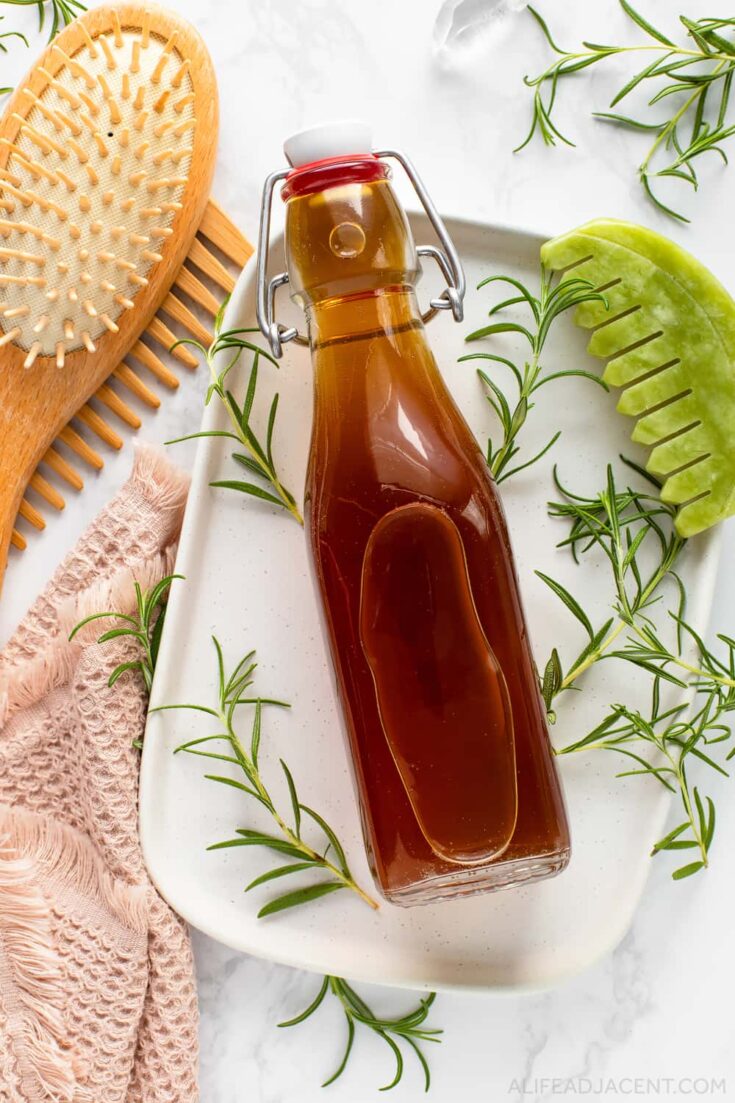
Rosemary Water for Hair Growth Recipe
Learn how to make rosemary water for hair! This natural remedy boosts hair growth and thickening, clarifies and soothes itchy scalp, and promotes silky, shiny hair. Use it to make hair growth spray, rosemary hair rinse, and more.
Materials
Rosemary Water with Dried Rosemary
- 1 litre distilled water
- 1/2 cup dried organic rosemary
Rosemary Water with Fresh Rosemary
- 1 litre distilled water
- 24 large sprigs fresh rosemary
Tools
- Small saucepan
- Metal strainer
- Swing-top bottle
Instructions
- Combine rosemary and water. Place rosemary in a stainless steel saucepan. Pour distilled water over top to cover the herbs, and stir to ensure the leaves are submerged. (If using fresh rosemary, be sure to wash it beforehand.)
- Boil rosemary. Bring the rosemary mixture to a boil and allow it to bubble for a few minutes. Stir the mixture again, then cover the pot with a lid and reduce the heat to low. Don't skip the lid – this helps prevent too much water from boiling off. (However, if you'd like a more concentrated rosemary hair tea, you can also choose to boil off more water.)
- Allow to simmer. Leave the rosemary water to simmer for 30-40 minutes, allowing the leaves to steep and release their benefits. There's no need to boil your rosemary for hours, which can degrade its quality. You'll know it's ready when the rosemary looks "cooked" and sinks to the bottom of the pot, and when the water is the color of tea. The darker the color, the stronger the rosemary water. It will also have a characteristic herbal rosemary fragrance, and smell a bit like tea.
- Allow to cool. If desired, you can continue to simmer and steep it to your desired strength. Once your rosemary water is strong enough, shut off the heat and allow it to cool to room temperature.
- Strain rosemary. Using a metal strainer, strain out the rosemary leaves from the liquid and transfer to your desired container, such as a large mason jar or spray bottle. Your rosemary water is ready for use as a hair rinse, hair growth spray, scalp tonic, and more.
Notes
How much rosemary should you use? Here's a general guideline – you can experiment with what works best for your hair type.
- For a gentle rosemary hair rinse, use 1/4 cup of dried rosemary (approximately 12 large sprigs of fresh rosemary) to 1 litre of distilled water.
- For strong rosemary water, use 1/2 cup dried rosemary (24 large sprigs of fresh rosemary) to 1 litre of distilled water.
- For a highly concentrated clarifying rinse, use 3/4 cup dried rosemary to 1 litre of distilled water (this is harder to achieve with fresh sprigs).
Recommended Products
As an Amazon Associate and member of other affiliate programs, we earn from qualifying purchases.
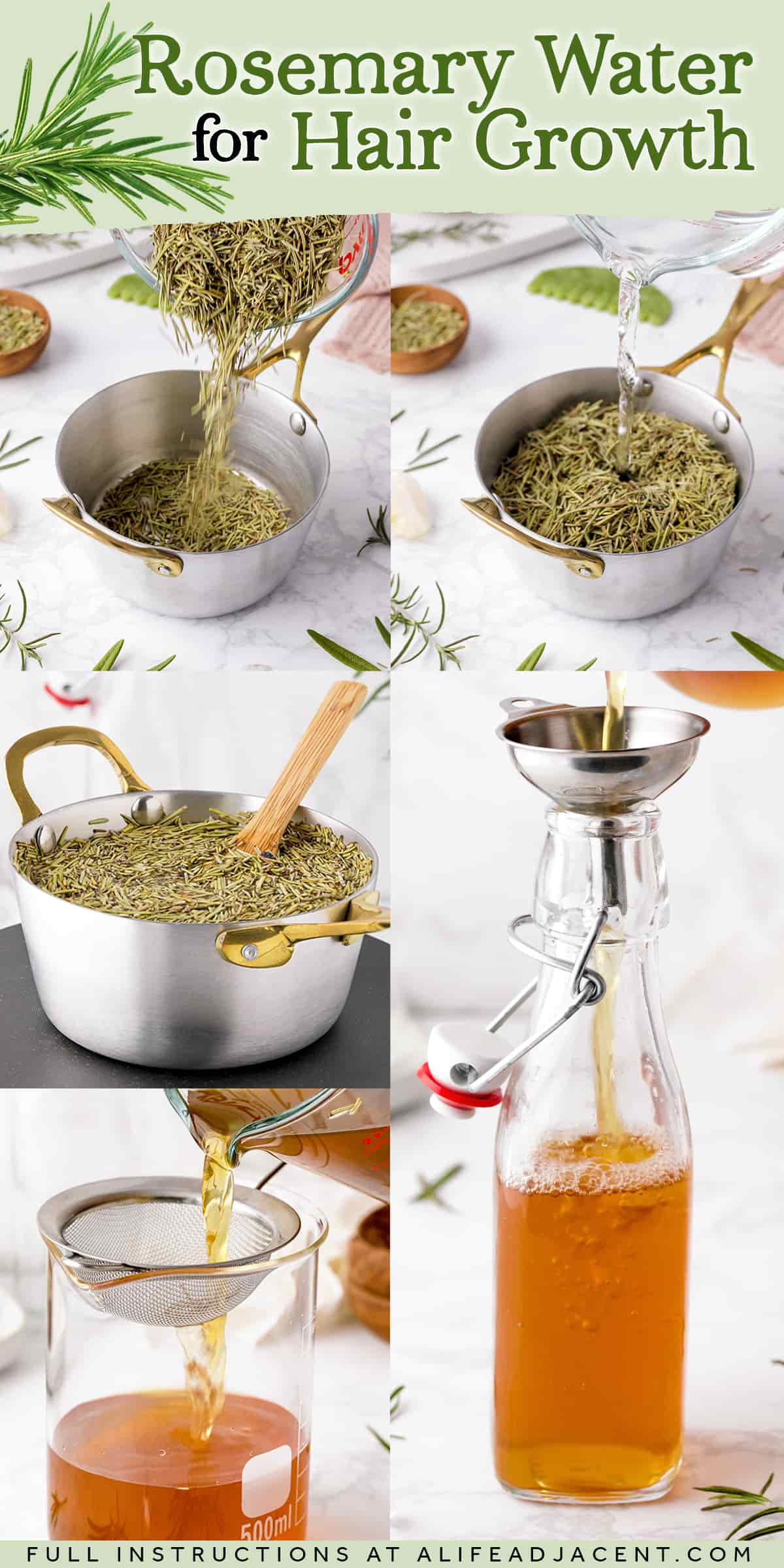
More DIY hair growth recipes
For more natural hair growth remedies and haircare recipes, see also:
- Rosemary Oil for Hair Growth
- DIY Lash Growth Serum
- DIY Hair Growth Masks
- Hair Growth Oil Recipe
- DIY Eyebrow Growth Serum
- DIY Dry Shampoo Spray
- Micellar Cleansing Water for Hair
- DIY Vinegar Rinse to pH-Balance Your Hair
For more natural homemade beauty recipes, follow us on Pinterest, Instagram, YouTube, Facebook, TikTok, and Twitter.
Pin it for later
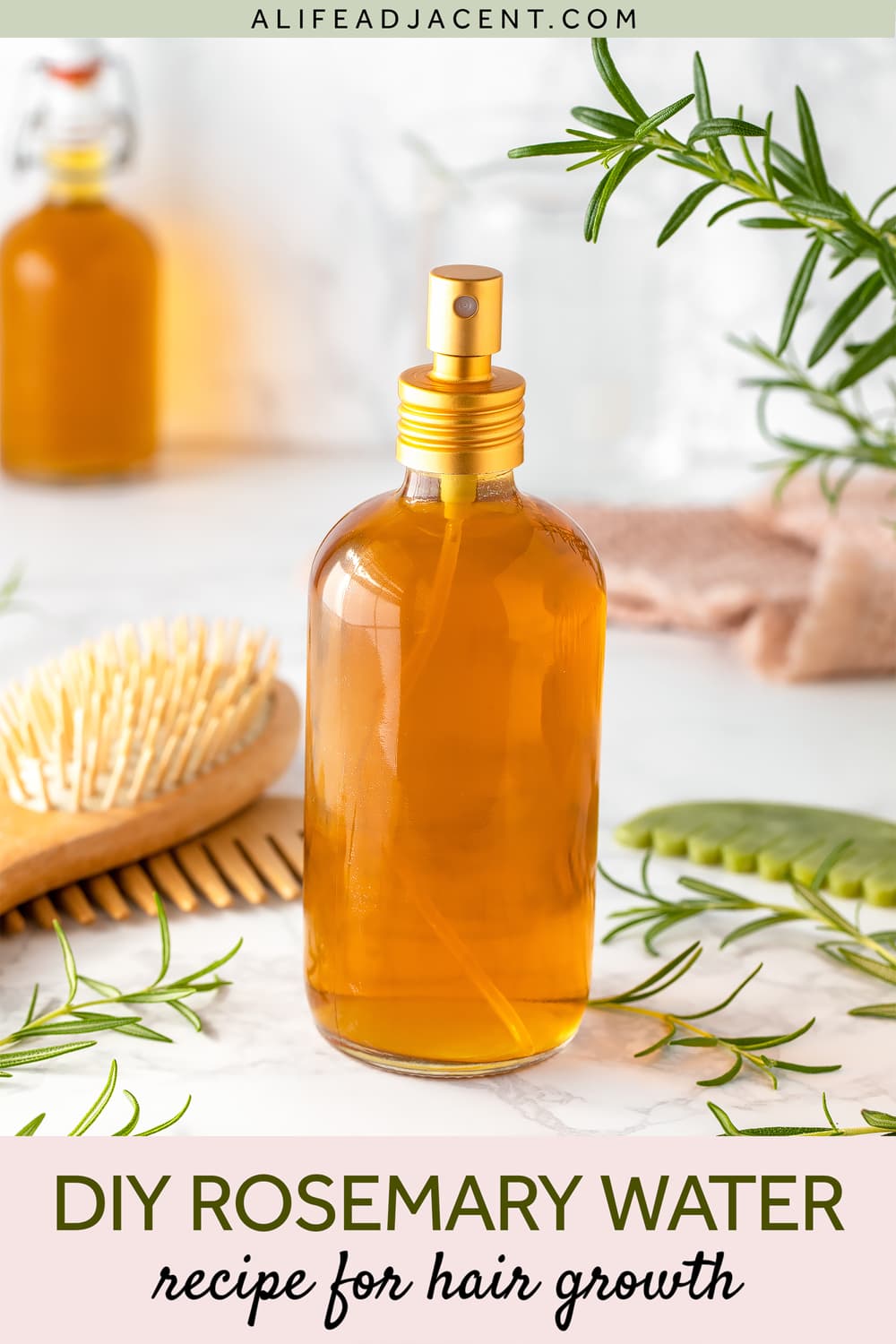
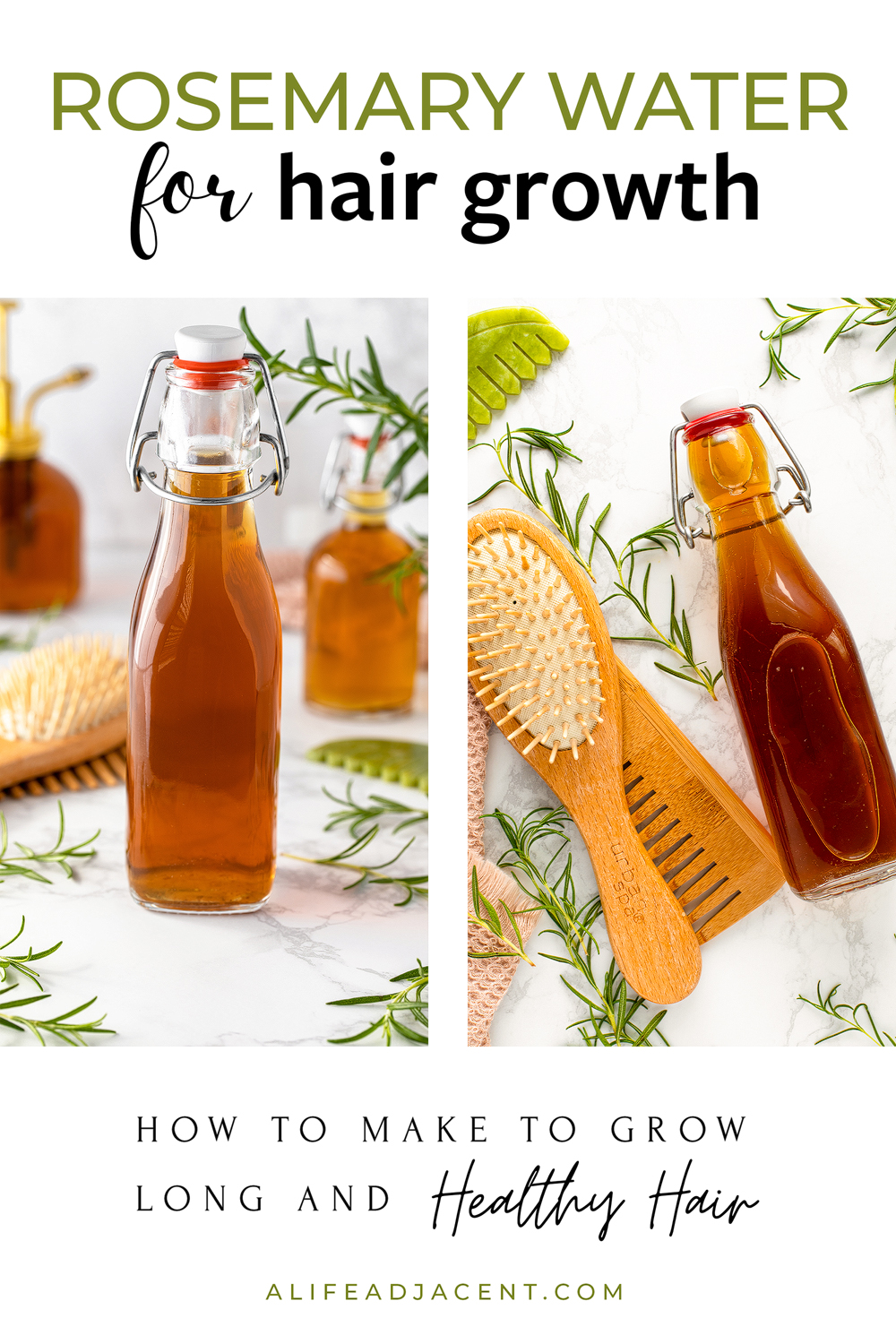
- Petiwala, Sakina M et al. “Polyphenols from the Mediterranean herb rosemary (Rosmarinus officinalis) for prostate cancer.” Frontiers in pharmacology vol. 4 29. 25 Mar. 2013, doi:10.3389/fphar.2013.00029
- Damyanova, Stanka & Tasheva, Stanislava & Stoyanova, Albena & Damianov, Dancho. (2013). Investigation of Extracts from Rosemary (Rosmarinus officinalis L.) for Application in Cosmetics. Journal of Essential Oil Bearing Plants. 13. 1-11. 10.1080/0972060X.2010.10643784.
- Cosmeticsdesign-Europe.com. “Powerful Protection and Repair for Hair.” Cosmeticsdesign, William Reed Ltd, 12 Mar. 2018, https://www.cosmeticsdesign-europe.com/Headlines/Promotional-Features/Powerful-protection-and-repair-for-hair.
- https://stylespeak.com/products/brand-reviews/tanino-protein-botox-is-the-next-leap-forwards-in-the-hair-treatment-segment/
- Gavazzoni Dias, Maria Fernanda Reis et al. “The Shampoo pH can Affect the Hair: Myth or Reality?.” International journal of trichology vol. 6,3 (2014): 95-9. doi:10.4103/0974-7753.139078
- Panahi, Y., et al. “Rosemary Oil vs Minoxidil 2% for the Treatment of Androgenetic Alopecia: A Randomized Comparative Trial.: Semantic Scholar.” Skinmed, 1 Jan. 1970, https://www.semanticscholar.org/paper/Rosemary-oil-vs-minoxidil-2-for-the-treatment-of-a-Panahi-Taghizadeh/ce0063f1a3c69976833b9daa37deadcba6e71ce8.
- Murata, Kazuya et al. “Promotion of hair growth by Rosmarinus officinalis leaf extract.” Phytotherapy research : PTR vol. 27,2 (2013): 212-7. doi:10.1002/ptr.4712
- Trüeb, Ralph M et al. “Scalp Condition Impacts Hair Growth and Retention via Oxidative Stress.” International journal of trichology vol. 10,6 (2018): 262-270. doi:10.4103/ijt.ijt_57_18
- Choi, June et al. “Effects of caffeic acid on cisplatin-induced hair cell damage in HEI-OC1 auditory cells.” International journal of pediatric otorhinolaryngology vol. 78,12 (2014): 2198-204. doi:10.1016/j.ijporl.2014.10.013
- Li, Jing-Jie et al. “The promotion of hair regrowth by topical application of a Perilla frutescens extract through increased cell viability and antagonism of testosterone and dihydrotestosterone.” Journal of natural medicines vol. 72,1 (2018): 96-105. doi:10.1007/s11418-017-1116-3
- Huang, Bo et al. “Melandrium firmum Extract Promotes Hair Growth by Modulating 5α-Reductase Activity and Gene Expression in C57BL/6J Mice.” Annals of dermatology vol. 31,5 (2019): 502-510. doi:10.5021/ad.2019.31.5.502
- Lee MY, Na EY, Yun SJ, Lee SC, Won YH, Lee JB. In vitro Study and Clinical Trial of Natural Essential Oils and Extract Against Malassezia Species. Korean J Med Mycol. 2018;23(4):91-98.
- Trüeb, Ralph M et al. “Scalp Condition Impacts Hair Growth and Retention via Oxidative Stress.” International journal of trichology vol. 10,6 (2018): 262-270. doi:10.4103/ijt.ijt_57_18
- Furlan, Aurélien L et al. “Red wine tannins fluidify and precipitate lipid liposomes and bicelles. A role for lipids in wine tasting?.” Langmuir : the ACS journal of surfaces and colloids vol. 30,19 (2014): 5518-26. doi:10.1021/la5005006
- Kumar Ashok, Praveen & Upadhyaya, Kumud. (2012). Tannins are Astringent. Journal of Pharmacognosy and Phytochemistry. 1. 45-50.
- Trüeb, Ralph M. “Oxidative stress in ageing of hair.” International journal of trichology vol. 1,1 (2009): 6-14. doi:10.4103/0974-7753.51923
- Fernández, Estibalitz et al. “Efficacy of antioxidants in human hair.” Journal of photochemistry and photobiology. B, Biology vol. 117 (2012): 146-56. doi:10.1016/j.jphotobiol.2012.09.009
- Tsai, Tsung-Hsien et al. “Rosmarinus officinalis extract suppresses Propionibacterium acnes-induced inflammatory responses.” Journal of medicinal food vol. 16,4 (2013): 324-33. doi:10.1089/jmf.2012.2577

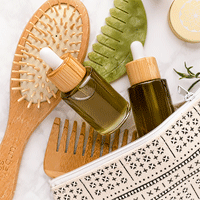
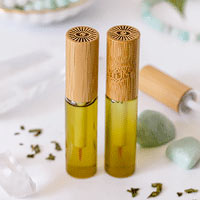
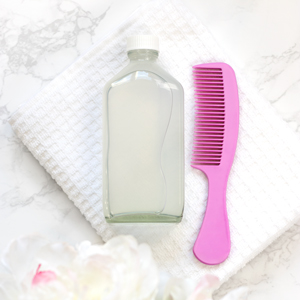
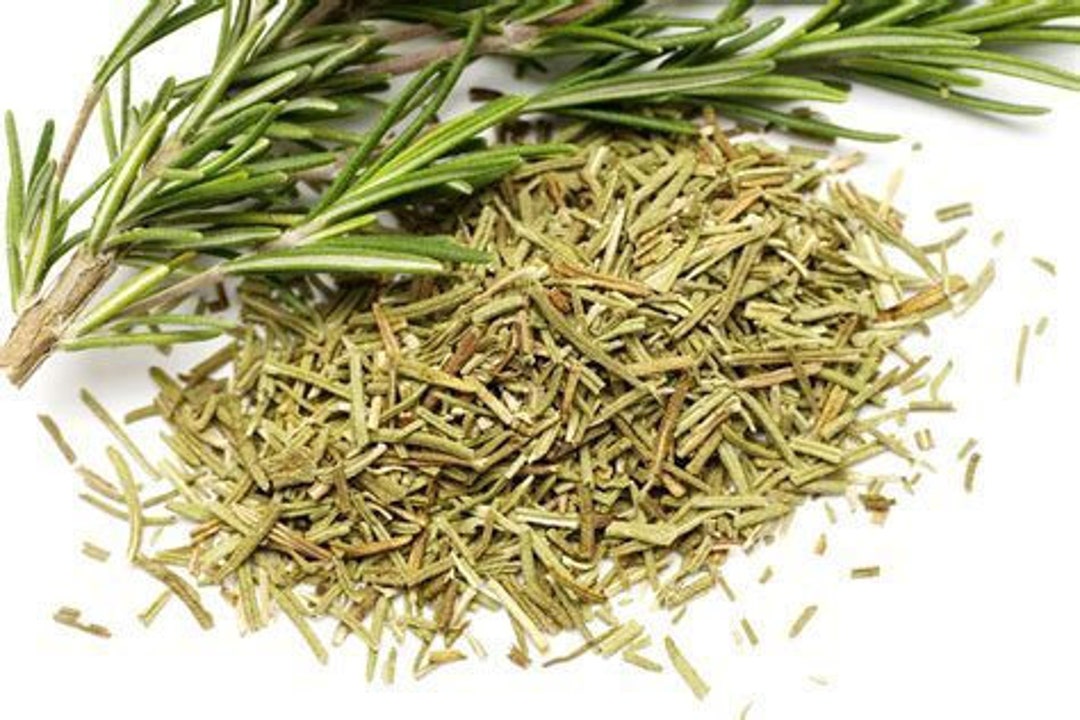


Rachel Colorado
Wednesday 6th of December 2023
I love your site and I remember the name, like a friend, now. Thank you!! I need this for scalp, but my son wants to grow a better beard. He is only 19 but working on health. His dad has only some hair patches on his face, so it could be genetic. ***Anyway, if he tries this on his face, do you have any other recommendations or ideas?*** He’s young and with lots of testosterone, yet he wants to always increase testosterone, so Rosemary seems great to prevent the DHT. But, maybe it is extra testosterone why he also gets some acne (or just because he’s unable to eat the best diet due to circumstances).
Kyla
Monday 11th of December 2023
Hi again Rachel, thanks for your kind words about our site! I'm so happy to hear that. I think the only issue with using rosemary water on the face is that it could be irritating. You might want to look into a caffeine serum for hair growth. Caffeine has really good results in hair growth studies (here's one comparing caffeine to minoxidil). I've heard that some people find using caffeine skincare products (like a face serum) makes their facial hair grow as well. I hope this helps!
Maureen
Saturday 30th of September 2023
If I make the rosemary water using dried herbs, does it keep indefinitely?
Kyla
Sunday 1st of October 2023
Hi Maureen, the rosemary water lasts 7-10 days in the fridge when made with fresh or dried herbs. I hope this helps!
Muntadar
Tuesday 26th of September 2023
How many days before the rosemary water expires ?
Kyla
Thursday 28th of September 2023
Hi Muntadar, fresh rosemary water should last 7-10 days in the fridge. 😊
Jay
Sunday 3rd of September 2023
Hi there, I like how extensive this article is. I'm currently experiencing a little hair loss. I do understand I'll have to figure out how often I can use the rosemary water as a leave in conditioner after washing my hair depending on how much it dries out my scalp. Though I hope you could tell me if it's ok to leave it on for 2 days straight before washing my hair. I was told 3-4 times is the max I have to wash my hair per week for hair loss. And if for instance I wash my hair 3 times a week is it ok to spray it on dry unwashed hair until it gets washed?
thank you!
Kyla
Monday 4th of September 2023
Hi Jay, personally, I often leave the rosemary water on my scalp for many days before washing. When I use it in the shower on clean hair, it stays there until my next wash (and I wash 1-3 times a week). Sometimes I also spritz my scalp mid-week, and leave it in for up to 3-4 more days before washing.
This has worked for me so far, but everyone is different, so like you said, you'll have to experiment with what feels best for your hair and scalp. I hope this helps, and I'm wishing you best of luck!
Chris
Tuesday 8th of August 2023
Hi Kyla, what a great article! I'm really glad I found this. It's very informative and profound, so you get a better feeling of what you're applying to your scalp and how it might affect you. I love that you talk about the effects of the components as well, very important. I gotta ask, how often should you use the spray for example? Like every day once? Or sometimes twice a day?
Much love, Chris
Kyla
Thursday 10th of August 2023
Hi Chris, thanks for the kind words! I spent a lot of time researching the different rosemary components, so I'm really glad to hear you found it informative.
As for how often to use the rosemary water, I think that consistency is key, and it's completely up to personal preference and how it fits into your lifestyle. I saw hair growth results even when I didn't use it every single day, so I would imagine using it daily or even twice a day would be even more effective. (In the study comparing minoxidil to rosemary, the treatments were applied twice a day.)
Of course, it likely depends on genetics and a variety of other factors, so I think everyone should experiment with what works for them specifically. I hope this helps answer your question!